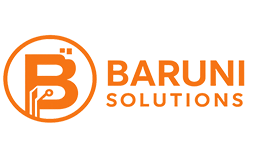Trusted by startups and Fortune companies
Tailored ERP Solutions & Modules
Following a thorough assessment of your business needs and financial considerations, we provide personalized ERP modules aimed at optimizing workflow efficiencies within your company.

Ready to Innovate?
Let's co-create groundbreaking products together, merging your vision with our expertise for unparalleled results.
Get StartedWe employ a variety of technologies
ERP Solutions we provide
As India's premier ERP solutions provider, we specialize in helping businesses efficiently manage and streamline their operations. Here's why we stand out:
- Access to India's Top 1% Software Talent
- Trusted by Startups to Fortune 500 companies
- From idea to deployment, we handle all aspects of ERP solutions
- Our global presence ensures time-zone-friendly interactions
- We adhere to top-tier data security protocols
- Count on us for on-time delivery without any surprises.
![]()
Ready to Innovate?
Let's co-create groundbreaking products together, merging your vision with our expertise for unparalleled results.
Get StartedGuide for Users to Understand ERP Software Development
Guide Topics
An Overview of ERP Solutions

Enterprise Resource Planning (ERP) solutions represent sophisticated software systems engineered to amalgamate and automate diverse business processes across an organization. These systems facilitate the effective management of fundamental functions including finance, supply chain, manufacturing, human resources, and customer relationship management.
At its core, an ERP solution aims to consolidate and optimize business operations by furnishing a unified repository for data and processes. By eliminating the necessity for disparate systems and manual data input, it enhances efficiency, data precision, and interdepartmental collaboration.
Benefits of ERP Systems
ERP software development services deliver a multitude of advantages for businesses, including:
- Enhanced Efficiency and Productivity: ERP software empowers businesses to manage their operations with greater efficiency, thereby boosting productivity.
- Informed Decision-Making: ERP systems furnish businesses with precise, up-to-date data across all facets of their operations, facilitating informed decision-making.
- Heightened Competitiveness: A well-implemented ERP system equips businesses to compete more effectively in the global market landscape.
- Elevated Profitability: Adoption of an ERP system frequently translates to heightened profits owing to enhanced efficiency and productivity.
Key Features and Functionality

An ERP (Enterprise Resource Planning) system encompasses a variety of essential features and functionalities to support diverse aspects of business operations. Here are some key features:
- Finance and Accounting Management: The ERP system facilitates tasks like general ledger and financial reporting, accounts payable and receivable, cash flow management, and budgeting and forecasting.
- Supply Chain and Inventory Management: It aids in procurement and vendor management, inventory control, warehouse management, and order management and tracking.
- Human Resources and Talent Management: It assists in managing employee data, time and attendance tracking, performance management, and payroll management.
- Customer Relationship Management (CRM): The ERP system integrates lead and opportunity management, customer service and support, sales and marketing automation, and customer analytics and segmentation.
In addition to these, ERP systems are utilized for project management, manufacturing and production control, and various other sectors, making them versatile tools for optimizing business processes and efficiency.
Implementing an ERP System

Implementing an ERP (Enterprise Resource Planning) system is a complex process that requires careful planning and execution. Here are the key steps involved:
- Project Planning and Management: Define project goals, scope, timelines, and resources. Establish a project management team to oversee the implementation process.
- Business Process Analysis and Documentation: Analyze existing business processes to identify inefficiencies and areas for improvement. Document current processes and map out how they will be transformed with the new ERP system.
- Data Migration and Cleansing: Transfer data from legacy systems to the new ERP platform. Cleanse and validate data to ensure accuracy and integrity.
- System Configuration and Customization: Configure the ERP system to align with your organization's specific needs and requirements. Customize the system to accommodate unique business processes.
- Training and Change Management: Provide comprehensive training to end-users on how to use the new ERP system effectively. Implement change management strategies to facilitate adoption and minimize resistance.
- Testing and Quality Assurance: Conduct thorough testing of the ERP system to identify and resolve any issues or bugs. Ensure that the system meets performance, reliability, and security standards.
- Go-Live and Deployment: Deploy the ERP system into production and transition users to the new platform. Monitor system performance and address any issues that arise during the initial rollout.
- Post-Implementation Support and Maintenance: Provide ongoing support and maintenance to address user inquiries, resolve technical issues, and optimize system performance. Continuously monitor and evaluate the ERP system to identify opportunities for improvement.
Integration with Existing Systems
Integrating an ERP (Enterprise Resource Planning) system with existing systems is crucial for optimizing data flow and enhancing business processes. Here are key considerations to ensure successful integration:
Identify Integration Needs:- Assess current systems and applications.
- Determine key data and processes for integration.
- Define integration level (real-time or batch).
- Specify data exchange requirements.
- Determine data transfer frequency and timing.
- Define data formats and communication channels.
- Assess ERP system's integration capabilities.
- Explore integration tools, middleware, or APIs.
- Consider custom development or third-party solutions.
- Map data between ERP system and existing systems.
- Plan data transformations or conversions.
- Ensure data consistency and integrity.
- Establish secure connections and protocols.
- Implement authentication and encryption.
- Ensure compliance with data security standards.
Frequently Asked Questions
Client Feedback on Our Services
We sincerely appreciate the trust our clients place in us and take pride in providing quality solutions that surpass their expectations. Here's what some of them have to say about their experiences:






